How Water Access Empowers Women and Girls: Women’s Equality Day
Why Water is Essential to Women’s Rights
Today in the United States, it’s Women’s Equality Day, a day commemorating the day on which women in the United States gained the right to vote.
While there are gender inequalities to address worldwide, one often-overlooked aspect of gender equality, especially in sub-Saharan Africa, is a lack of access to sufficient clean water.
Women and girls in sub-Saharan Africa bear the primary responsibility of fetching water, a task that can take hours every day and severely limits their ability to pursue education, work, or even rest.
Women and girls are responsible for fetching water in 7 out of 10 households without supplies on premises.
World Health Organization
This burden is most acutely felt in sub-Saharan Africa, where only 31% of the population has access to safely managed water sources (“safely managed” meaning: water sources that are accessible on premises, available when needed, and free from fecal and chemical contamination). These statistics hold significance because fetching water not only consumes women’s time, but also impacts their health, education, and economic opportunities.
A society can only achieve high rates of public health, gender equity, educational attainment, and economic productivity when all of its members enjoy their rights to water and sanitation.
United Nations Water
This article will address specifically how water impacts women’s empowerment in sub-Saharan Africa — and how we at The Water Project are fighting to empower women and girls through access to safe, reliable water.
Responsibility for (Rather than Ownership of) Water
In the United States, where water is piped into households, the concept lacks any gender ties. But in sub-Saharan Africa, where water-fetching is a daily chore, acquiring water for a household is seen as a domestic chore. In this region, domestic chores are still reserved almost exclusively for women, with women undertaking four times as much unpaid household labor as men.
“Like most men in our community, I had always left the responsibility of fetching water to my wife,” said farmer John Wafula from Mukhulutsi Community in Western Kenya.
It was only thanks to our community hygiene and sanitation training that John recognized his complacency when it came to ensuring his household remained supplied with water.
“From this training, I have realized that I, too, have a role to play in ensuring that my family [can] access safe and clean drinking water,” John continued. “All along, we have always left this responsibility to women.”
Yet, because women are so involved in household duties in sub-Saharan Africa, they are often excluded from decision-making — even within water, which is allegedly women’s realm.
In 2020, only 26 percent of countries had achieved high or very high levels of gender mainstreaming in water resources management and related laws and plans.
United Nations Stats
Health and Productivity Effects
Carrying heavy water burdens for such a large portion of their time takes a heavy toll on female bodies, causing musculoskeletal disorders and even disabilities.
“Despite my old age, I still have to fetch water for my family,” said 55-year-old farmer Anastasia Mutave Mangala from Katavui Community in Southeast Kenya, which is still in need of its own safe water source.
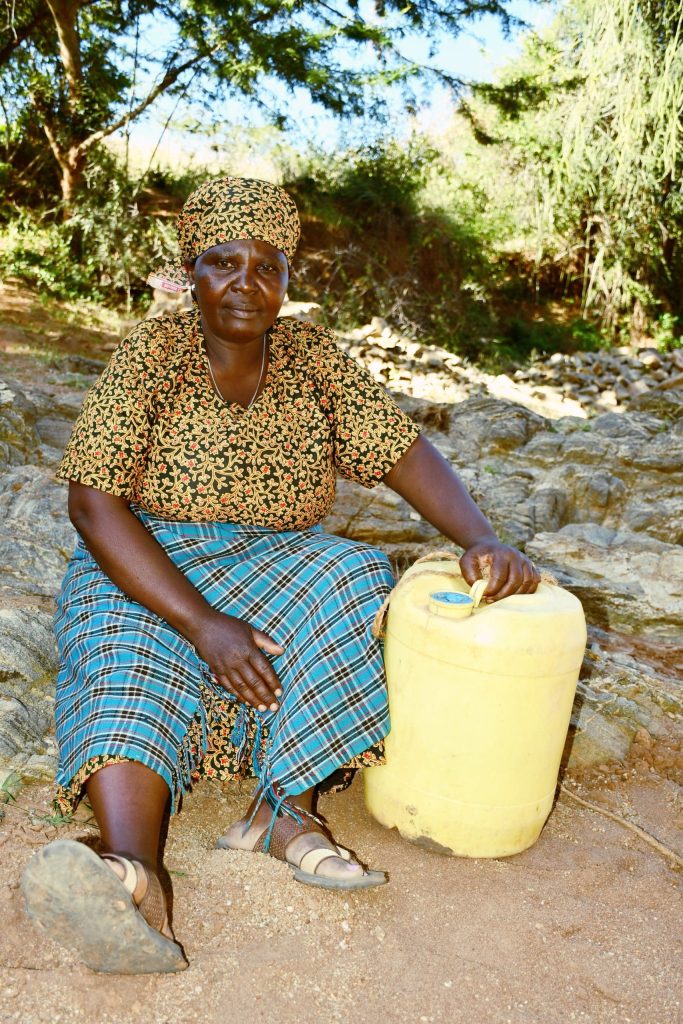
“The long journey while carrying water on my back has caused back and leg pain. Nowadays, I walk with a slight limp because of my left leg, which pains [me] a lot when [I] fetch water. Walking to the water point and then back home is also a tedious affair. I barely get time to focus on activities such as hygiene and sanitation or tending to livestock.”
But, unfortunately, bodily injury from carrying water isn’t the only way a lack of safe water hurts women and girls’ health.
Access to clean water is critical for proper menstrual hygiene. Without the ability to regularly wash their bodies or clean their period materials, women and post-pubescent girls face increased risks of infections such as urinary and reproductive tract infections (UTIs). This is due to the use of unhygienic menstrual materials (like rags or leaves), compounded by the lack of access to clean water for washing themselves and their menstrual products. Without access to water and other key menstrual hygiene management tools, girls often skip school or even drop out of school entirely when they reach puberty.
Another associated risk for women’s and girls’ health in conjunction with a lack of water is their role as primary caregivers in households. This role forces them to bear the brunt of the health risks associated with poor water access. When family members fall sick due to contaminated water (or a lack of enough water to conduct proper hygiene and sanitation tasks), it is typically women who must care for them, which leads to strain on their physical and mental health and exposes them to increased risks of falling ill themselves.
This disadvantage is exacerbated by the fact that only 52% of healthcare facilities in sub-Saharan Africa have even basic water resources, which limits the facilities’ abilities to provide adequate care to patients (including such basic amenities as drinking water, patient meals, and access to water for bathing and toileting). As primary caregivers, women are typically the ones to bring sick family members for treatment. But when healthcare facilities lack water, women must bring their own water for cleaning, cooking, and caring for the sick.
Women are also more vulnerable to water-related diseases during pregnancy when infections can lead to severe complications for both mother and child.
“Lack of access to clean water and living in environment with dirty stagnant water are known to result in largely preventable water–related diseases that can lead to severe impact adverse pregnancy outcomes. Those diseases are malaria, typhoid, chronic hookworm infestations like ankylostomiasis, dysentery, cholera, giardiasis, amoebiasis, etc.”
Maternal Health Task Force
The subsequent lack of productivity caused by water-related illnesses in themselves and their household members increases women’s likelihood of being abused by their spouse or intimate partners, since a lack of productivity will interfere with the runnings of their households.
Economic Disadvantages
Without access to clean water, women and girls are often trapped in a cycle of poverty, unable to extricate themselves from potentially harmful intimate partner relationships. Time spent fetching water is time lost for pursuing income-generating activities. The UN estimates that women and girls waste 200 million hours per day fetching water worldwide.
And even when they do have time and energy for working, women in sub-Saharan Africa often do unpaid work, such as laboring on family farms — as many as 70% of unpaid workers on subsistence farms in sub-Saharan Africa are women. This unpaid labor severely limits their time for education, skill development, and income-generating activities.
When women become ill from water-related illness, or they are forced to care for a family member sick with a water-related illness, this also prevents them from being able to work consistently. In agricultural communities, unreliable water sources mean poor crop yields, which further limit women’s ability to support their families financially, as is the case for Agnes from Nyakatiti Community in Uganda.
“The water situation affects my health and the health of my one-and-a-half-year-old child, Esther,” said Agnes. “Last month, we had stomach aches and diarrhea, which lasted for four days. We spent a lot of money on treatment.”
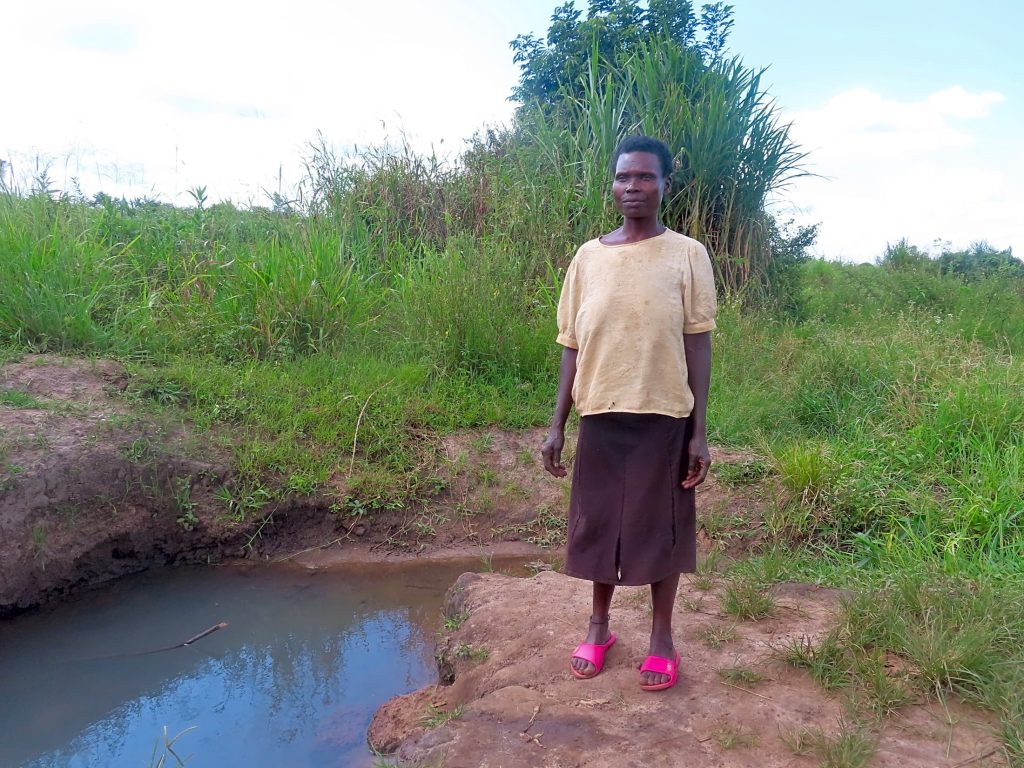
“As a farmer, it cost me a lot [of time], missing [my] garden for all the four days,” Agnes continued. “With the poor rains nowadays, I missed planting on time, and all the plants didn’t come out well, which will result in low output. The frequent sickness also makes me weak, leading to [a] reduction in energy levels, affecting [my] work and output.”
“For women, having their own resources, such as owning assets or receiving income from a paid job or through social protection, puts them on a more equal footing with men in their intimate relationships, strengthens their bargaining position within families and enables them to exit partnerships if they so choose.”
UN Women
The lack of access to clean water perpetuates deep-seated gender inequalities that keep women economically dependent and vulnerable to exploitation.
The Data Gap
With such a pronounced mismatch between the way a lack of safe water affects men and women, the need for gender-disaggregated study on the matter is clear. However, there have been limited studies on the way water affects women specifically.
This lack of female-focused data in water-related research makes it difficult to quantify the full scope of the issue and means that women’s specific needs are often overlooked in policy and program design.
“Research assessing the intersection between gender and water is severely lacking and remediating gender-water inequities will require targeted resources to fill in the gaps.”
Pouramin et. al.
Historically, data collection efforts in many sectors, including water, sanitation, and hygiene (WASH), have been gender-neutral, often focusing on households or communities without breaking down the specific experiences of women and men. Even today, gender considerations are sometimes seen as secondary or add-ons to water projects rather than integral elements.
This data gap is particularly surprising given the fact that the United Nations’ Sustainable Development Goal (SDG) that all non-governmental organizations are striving to achieve with regards to water, sanitation and hygiene worldwide specifically calls for “special attention to the needs of women and girls and those in vulnerable situations.”
Addressing this data gap requires intentional efforts to make gender-disaggregated data a priority.
Dreams for the Future
It’s true: the lack of access to clean water restricts the dreams and aspirations of countless women and girls across sub-Saharan Africa. But this also means that providing communities with safe, reliable water sources also serves to empower women and girls in new, exciting ways.
Below are some quotes collected from The Water Project’s Year After Reports, which document the incredible changes that have occurred for women and girls who once suffered under the burden of water stress or scarcity, and who now enjoy safe water within a reasonable walking distance from their homes.
Maureen
“The water source was quite far from my home,” said Maureen from Shitoto Community in Western Kenya. “I took a lot of time to get the water and do other chores.”
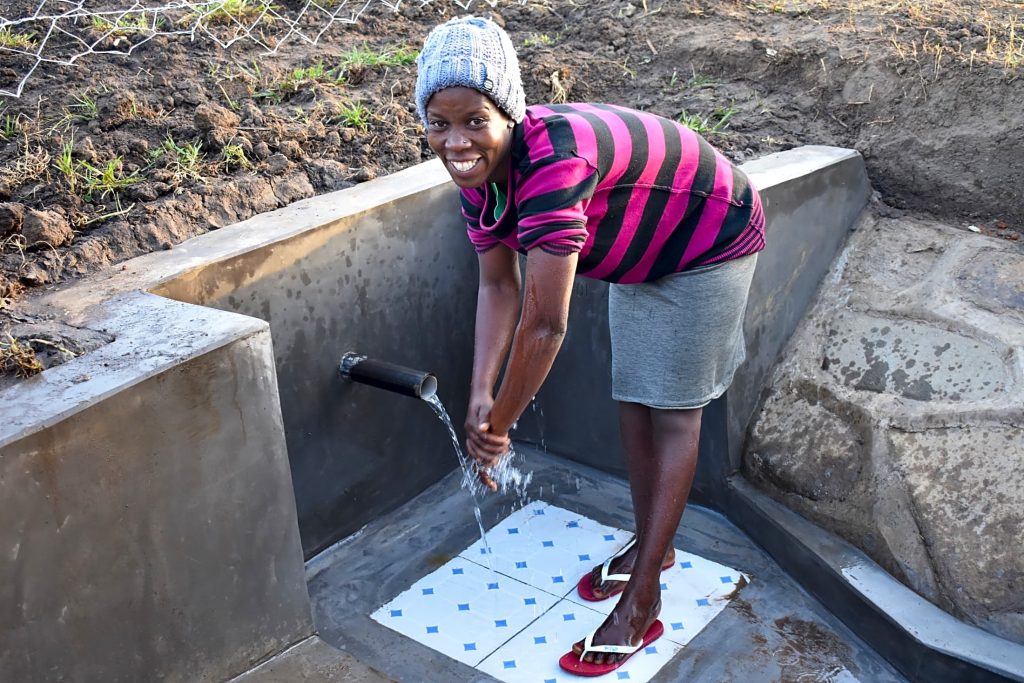
“Having a reliable water source has really improved our rice-growing project due to having a proper drainage system. This has improved our financial stability immensely. We took [the] initiative to start growing onions, kale, cowpeas, and arrowroots. We are now able to cater [to] our families’ needs with less strain. My dream is to be the best farmer around this place. It is certain that access to safe and clean water will make it easier for me.”
Felistus
“Nowadays, my health is quite good, and this has enabled me to work on my farm, which has given [me] more produce than the previous years,” said Felistus from Isongo Community in Western Kenya.
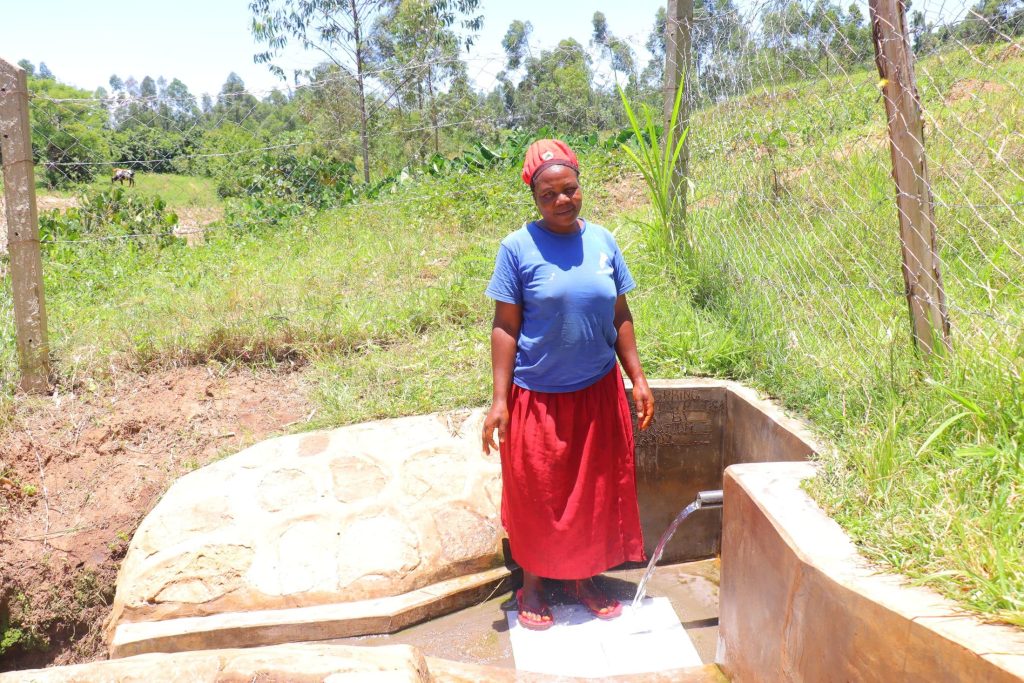
“[I] am glad to report that this year, my family and I have not starved because we were [healthy] and worked hard to kick off the hunger.
“My dream is to expand my farming through land leasing, because my piece of land is relatively small, and I cannot get a lot from it. I desire to supply vegetables to [as] many schools as possible. I no longer worry about safety because the terrain is good, which makes access easy. The water point is protected by [a] fence, and it’s very clean [and] clear with no bushes around.”
Esther
“My health has improved, [and there is] no more missing school due to sickness,” said Esther from Muchanja Primary School in Western Kenya.
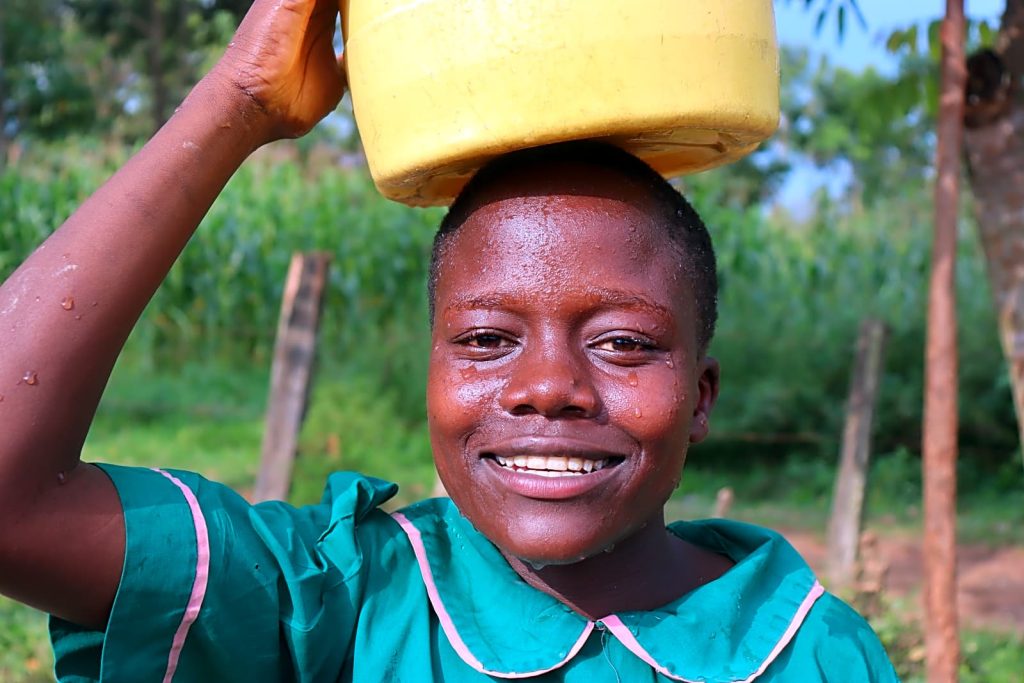
“I now have peace of mind and can be in school comfortably. My hygiene has changed. I wash my hands often. We have [a] steady supply of water and as a girl, we can comfortably bathe and [be] refreshed in school. I dream of being a nurse so that I will take care of the sick and eventually give back to my community.”
Dorcus
“I am very happy about this project because I am no longer absent from school due to diarrhea or stomach upsets caused by drinking contaminated water,” shared Dorcas from Syunoo Community in Southeast Kenya.
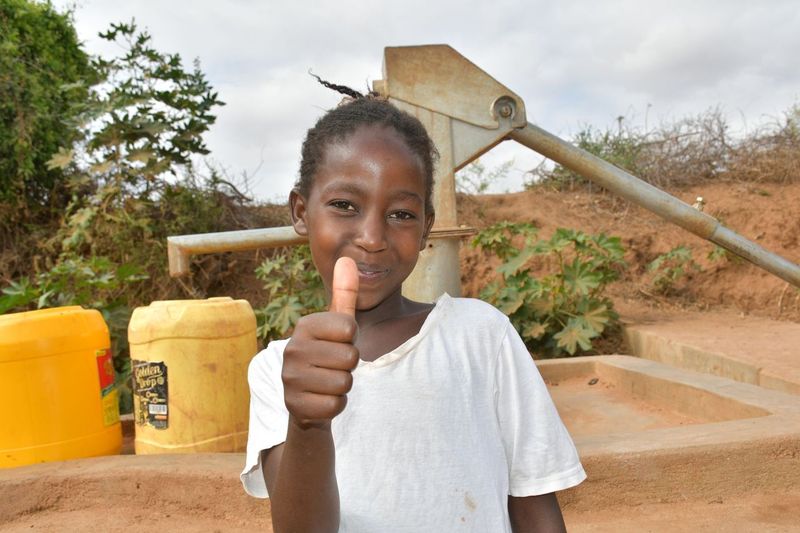
“My studies have improved because I am no longer absent from school due to water-related maladies. I [am] also more active with classwork because I am not spending a lot of energy fetching water from the previous distant source. I also get more time to play with friends because I do not spend most of my time helping my family draw water from the distant Enziu River. I hope that one day I will be a teacher, and since I now have more time to study, I believe I will achieve my dream.”
Esther
“This waterpoint has enabled me [to] plant and sell vegetables throughout the year; this has made me earn an extra income,” said Esther from Shiralumwa Community in Western Kenya.
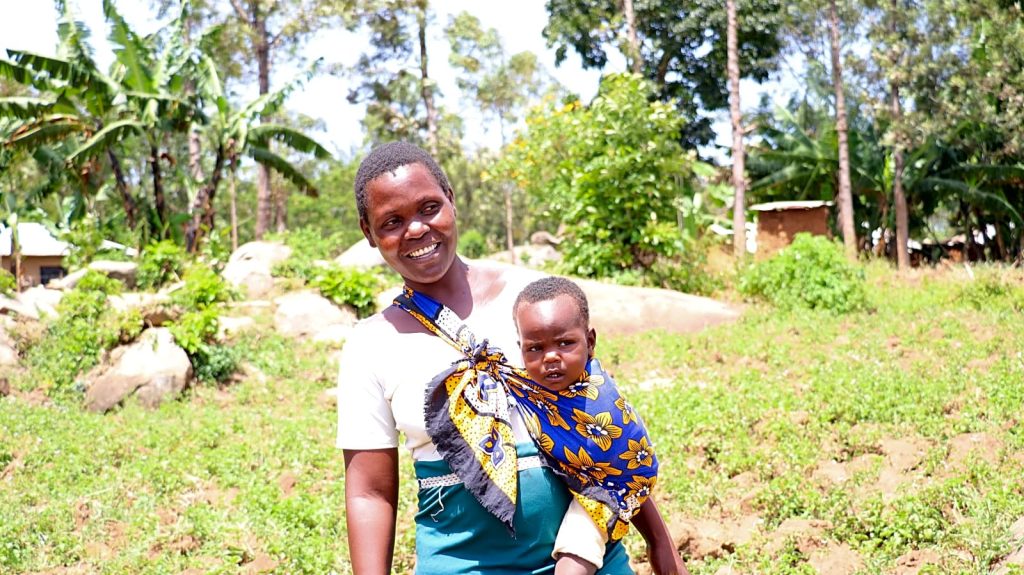
“This extra income has helped me support my husband with the household bills. My dream is to fully engage myself in farming since that is the area [I] am good at. I want to diversify by incorporating different crops aside from vegetables. I want to start rearing dairy cattle for milk. Since this area has [a] scarcity of milk, I will be able to open a dairy where I will sell the milk.”
Melvin
“We used to go to collect surface water in the forest which is quite a distance from the school,” explained Melvin from Gamudusi Primary School in Western Kenya.
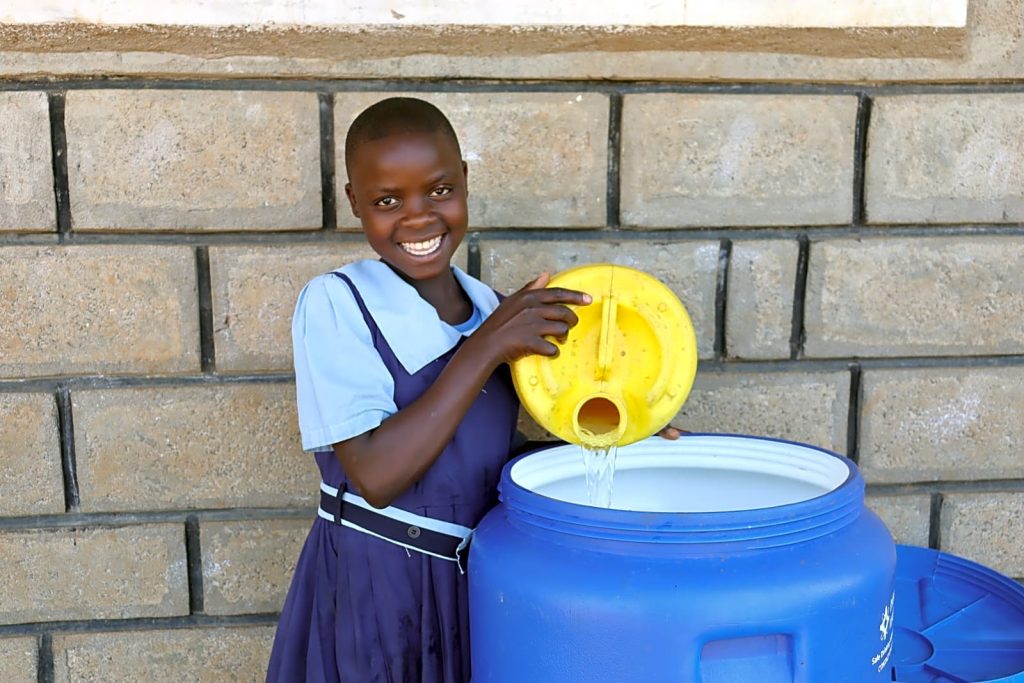
“It was so hectic because carrying water from that far was very tiresome. The place and terrain are hilly, so by the time [you’re] reaching school, you are very exhausted. Carrying water to school was another problem as you needed to have a rest at some point because of the bad terrain. The challenge made some of the learners hate coming to school.
“I was doing badly in mathematics before, but from the last term’s results, I was above average. When I grow up, I wish to be a pilot. That is my greatest dream and I would love to visit different places of the world,” concluded Melvin.
Sharon
“My academic performance has improved since the waterpoint was installed,” said Sharon from Chomoroni Secondary School in Western Kenya.
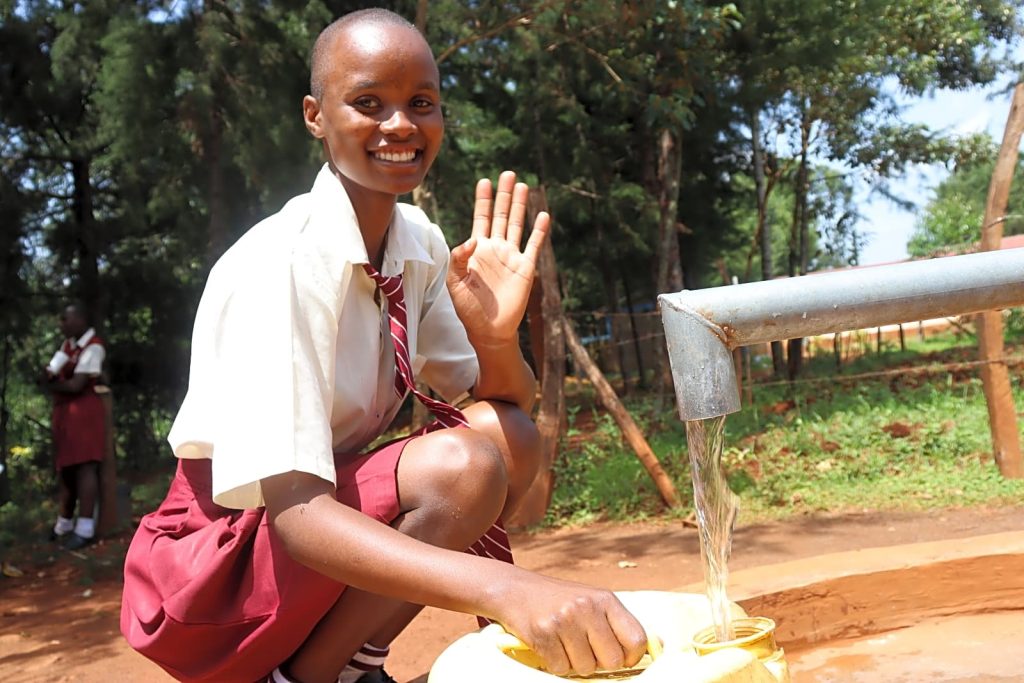
“I am neat [and] I have clean uniforms, which boosts my self-esteem. Thus, I concentrate better in my studies, and my mind is at ease. When I am not in class, I take part in extracurricular activities like school games and clubs. In the agricultural club, I have a small farm where I have vegetables I tend to.
“I would like to be a president or be in a position of power where I can effect real change, [and] ensure all schools and institutions get basic needs, water included.”
Conclusion
Access to clean water is a fundamental human right, and its absence continues to disproportionately affect women and girls in sub-Saharan Africa. From fetching water to managing hygiene, women bear the burden of time poverty, health risks, and economic disadvantages. Without clean water, their ability to pursue education, economic empowerment, and leadership opportunities is severely limited.
However, with reliable access to safe water, as seen in the personal stories shared here, women can break free from these cycles, improve their health, pursue their ambitions, and contribute to their families and communities in profound ways.
The Water Project is working to bring safe, reliable water sources to communities across sub-Saharan Africa, empowering women and girls to reclaim their time, health, and potential. Every donation helps us support women like Maureen, Felistus, Esther, and countless others who are turning their dreams into reality with the help of clean water.
Join us in making a difference. Donate today to help us continue empowering women and girls through the gift of safe water. Together, we can unlock the potential of a generation.
Home More Like ThisTweet